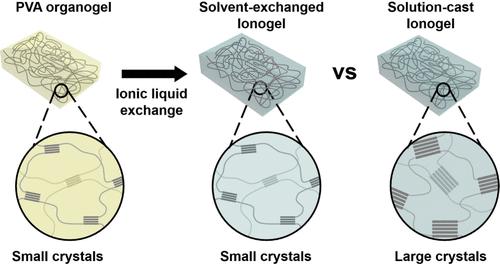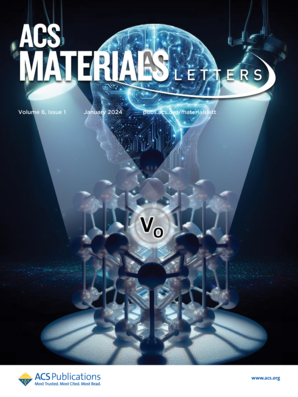Ultrastretchable, Tough, and Highly Conductive Ionogels for Multipurpose Motion Monitoring
IF 9.6
1区 化学
Q1 MATERIALS SCIENCE, MULTIDISCIPLINARY
引用次数: 0
Abstract
Stretchable strain sensors have attracted considerable interest for electronic and electrochemical applications, but improving their sensitivity, stretchability, toughness, conductivity, and stability remains a challenge. While ionic conductor-based sensors offer high stretchability (>100%), achieving both robustness and high conductivity is difficult. In this study, ultrastretchable, tough, and highly conductive nonvolatile polymer electrolytes, referred to as ionogels, were devised using a solvent-exchange method. Compared to other gel-type materials, such as organogels and hydrogels, the ionogels exhibit outstanding elasticity (>1000% strain at break), toughness (∼100 MJ m–3), and ionic conductivity of (∼20.5 mS cm–1). These ionogels were successfully applied to sensing devices, and the resulting sensors exhibited excellent linearity, sensitivity, repeatability, and operational durability. Furthermore, the sensors accurately detected the movements of various vehicle parts, including the suspension damper, door hinge, and seat coil, indicating the potential of mechanically tough ionogels for multipurpose sensing systems.

用于多用途运动监测的超拉伸、坚韧和高导电离子凝胶
可拉伸应变传感器在电子和电化学应用领域引起了广泛关注,但提高其灵敏度、可拉伸性、韧性、导电性和稳定性仍是一项挑战。虽然基于离子导体的传感器具有很高的可拉伸性(100%),但要同时实现坚固性和高导电性却很困难。本研究采用溶剂交换法设计出了超伸展性、韧性和高导电性的非挥发性聚合物电解质(称为离子凝胶)。与有机凝胶和水凝胶等其他凝胶型材料相比,离子凝胶具有出色的弹性(断裂应变达 1000%)、韧性(100 MJ m-3)和离子导电性(20.5 mS cm-1)。这些离子凝胶被成功应用于传感装置,所制成的传感器具有出色的线性度、灵敏度、可重复性和操作耐久性。此外,这些传感器还能准确检测到悬挂减震器、车门铰链和座椅线圈等各种汽车部件的运动,这表明机械韧性离子凝胶在多用途传感系统中的应用潜力。
本文章由计算机程序翻译,如有差异,请以英文原文为准。
求助全文
约1分钟内获得全文
求助全文
来源期刊

ACS Materials Letters
MATERIALS SCIENCE, MULTIDISCIPLINARY-
CiteScore
14.60
自引率
3.50%
发文量
261
期刊介绍:
ACS Materials Letters is a journal that publishes high-quality and urgent papers at the forefront of fundamental and applied research in the field of materials science. It aims to bridge the gap between materials and other disciplines such as chemistry, engineering, and biology. The journal encourages multidisciplinary and innovative research that addresses global challenges. Papers submitted to ACS Materials Letters should clearly demonstrate the need for rapid disclosure of key results. The journal is interested in various areas including the design, synthesis, characterization, and evaluation of emerging materials, understanding the relationships between structure, property, and performance, as well as developing materials for applications in energy, environment, biomedical, electronics, and catalysis. The journal has a 2-year impact factor of 11.4 and is dedicated to publishing transformative materials research with fast processing times. The editors and staff of ACS Materials Letters actively participate in major scientific conferences and engage closely with readers and authors. The journal also maintains an active presence on social media to provide authors with greater visibility.
 求助内容:
求助内容: 应助结果提醒方式:
应助结果提醒方式:


